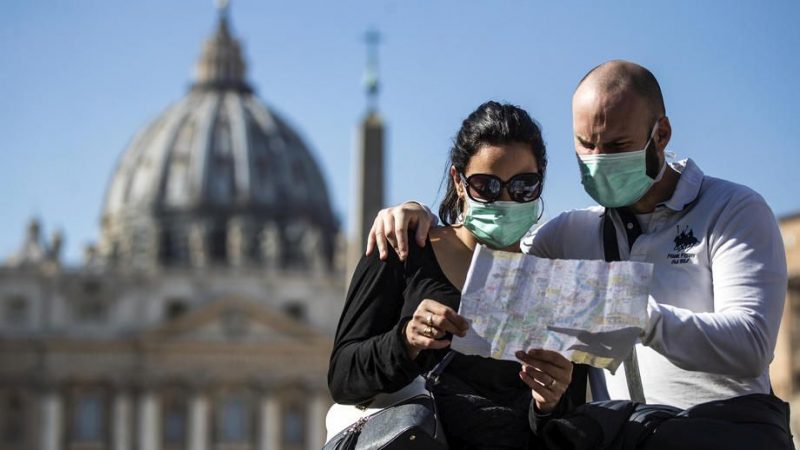Impact of COVID-19 on Global Tourism
The global natural resources are shrinking every day owing to excessive extraction and massive industrial production. This vicious cycle has been going on ever since the industrial revolution. Hence human civilization is exploring for new renewable and sustainable way of living for a while. From late 19th century and hereafter tourism is playing emergent role to the global economy, especially for the island nations and other states with ample scenic beauties and having exigency of natural resources i.e. heavy minerals. But this reliable financial contributing sector is facing an unprecedented crisis with the outbreak of COVID-19. Because of this pandemic, global health, economy, social aspects are being under threat but somehow they are functioning is a limited scale but tourism is among very few halted completely due to the COVID-19 pandemic. The unprecedented blow of COVID-19 on tourism has already cut the global tourist’s movement because of the travel restrictions and shutting down the boarders. The global tourism never experienced such crisis ever since 1950 and expected to worse beyond the 2009’s financial crisis. Owing to this crisis, this present study will examine the impact of COVID-19 pandemic on global tourism and recommend possible solution later on.
From December 2019, the world is facing an unprecedented global health, social and financial constraints and emergency due to the COVID-19 pandemic. Since the pandemic has cut international tourist arrivals so it blows the tourism sector enormously. Tourism sector is the most affected sectors as the airplanes are grounded due to the shutdown of boarders; travel restrictions and lodging at the hotels are banned practically all over the world. Consequently, the pandemic hits the tourism sector in the hardest way. Many tourism business ventures are at financial difficulties due to the sharp decrease of business, loss of job at national and global levels. Though tourism has the resilience to cope with the emergency and sustain very effectively but with the depth and level of crisis induced by the COVID-19 pandemic will put the tourism industry in backward position for a while. Undoubtedly, the travel behavior of the people will be certainly change considering the pandemic prevention and protection plan so the tourism sector will suffer further than any other sectors. The pandemic effect of tourism hits badly to the least developed countries and island states around the world as it contributes 9.5% to their GDP (Vickers, 2020). The sector primarily functions with mainly social interaction and that is strictly halted by the respective government as the part of prevention measures. It’s been stated by The World Tourism Organization (UNWTO) that, the tourism sector is the most heavily affected by the COVID-19 with the estimation of 20-30% reduction of international tourists arrival with is equivalent to the global loss of US$30-50 billion (“WORLD TOURISM ORGANIZATION”, 2020). The situation is worst for the least developed countries with the tourism possibilities.
Travel and Tourism is considered as a sunrise industry which accounted for 10% (US$ 8.9 trillion) of the global GDP, 330 million jobs (one on every ten jobs), 6.8% (US$ 1.7 trillion) of total global exports and 4.3% (US$ 940 billion) of total investment in the year 2019 (WTTC, 2020). However, with the advent of the year 2020, the industry has experienced massive turmoil in the face of a never before health emergency i.e. The COVID-19 outbreak across the globe (Jamal and Budke, 2020). The impacts of this unparalleled disease on the travel and tourism sector are unprecedented and fast-changing in nature (WTO, 2020). It is estimated that the tourism industry is going to be the hardest-hit industry in this pandemic scenario with negative impacts spread on to both demand and supply of tourism products (WTO, 2020). Further estimates suggest that the travel and tourism sector will take a dip of 20-30% in the international tourism arrivals (WTO, 2020) and a loss of 50 million jobs throughout the global industry (WTTC, 2020). Keeping the above facts in mind, it would not be an exaggeration to state that this disease has become the biggest and never-seen-before threat to the global tourism industry. Extraordinary problems like these call for extraordinary solutions.
- Due to the COVID-19 pandemic the tourism sector hits very badly. This is by far the worst result in the historical series of international tourism since 1950 and would put an abrupt end to a 10-year period of sustained growth since the 2009 financial crisis.
- In an unprecedented blow to the tourism sector, the COVID-19 pandemic has cut international tourist arrivals in the first quarter of 2020 to a fraction of what they were a year ago.
- Available data points to a double-digit decrease of 22% in Q1 2020, with arrivals in March down by 57%. This translates into a loss of 67 million international arrivals and about USD 80 billion in receipts.
- Prospects for the year have been downgraded several times since the outbreak in view of the high level of uncertainty.
- Current scenarios point to declines of 58% to 78% in international tourist arrivals for the year, depending on the speed of the containment and the duration of travel restrictions and shutdown of borders, although the outlook remains highly uncertain (the scenarios are not forecasts and should not be interpreted as such).
- The scenarios reflect three possible patterns of monthly change in arrivals from April to December 2020 supposing that travel restrictions start to be lifted and national borders opened in early July (Scenario 1: -58%), in early September (Scenario 2: -70%) or in early December (Scenario 3: -78%).
- These scenarios would put 100 to 120 million direct tourism jobs at risk.
- Sentiment expressed by the UNWTO Panel of Experts points to a start of the recovery of international demand mostly in 2021. According to Panel Experts from around the world, domestic demand would recover faster than international demand.
- Considerable challenges remain ahead, starting with the unknown duration of the pandemic and travel restrictions, in a context of global economic recession. Countries around the world are implementing a wide range of measures to mitigate the impact of the COVID- 19 outbreak and to stimulate the recovery of the tourism sector.
Recommended Recovery Plan
This study came up with some recommendations to mitigate the loss of tourism sector due to the COVID-19 pandemic outbreak around the world:
- It is proved that tourism sector has the capacity of bounce back recover very fast than any other sectors. Nonetheless, the tourism industry’s recovery isn’t only reliant on lifting COVID-19-forced travel restrictions to empower an arrival of guests; the part will recoup once the networks where individuals live become ok for occupants, which warrants the incorporation of the travel industry in national and worldwide recovery bundles to help the healthcare services framework.
- Understandably, all countries haven’t the same capability to handle the pandemic in fair way; so the recovery will not be so easy for all, especially the least developed countries with small economic strength.
- All countries should ensure strict health measures to prevent the transmission so the perception of the tourist could be changed completely.
- Since travel is the key aspect of well-being so the travel style need to change and revised to complying with the pandemic prevention plan of all countries.
- To enhance future business ventures and protect existing dying tourism industries trade assessment expected to help the livelihood ultimately.
- According to the loss statement, an immense amount of financial support through attractive package would be preferable and required to mitigate the damage and ensure resilient recovery and sustainability.
- Financial support for the tourism sector can be in the form of low interest or interest free loan for a certain time period to the destitute business ventures. In addition of the bank loan, VAT and all kinds of taxes for the tourism business ventures can be deferred or waived to protect the companies form bankruptcy.
- Like the support model of World Health Organization, International Monetary Fund (IMF), World Bank and regional banks could offer financial supports to the destitute companies and states.
- Since, some countries have declared as safe i.e. China, Vietnam so inbound tourism need to promote in such regions to restore the domestic tourism and sustain this sector and for the international travel, the government should give the confidence to the international tourists with health safety soon after the international boarders open.
References:
Vickers, B. (2020, May 13). COVID-19 hitting tourism hard: What does this mean for the world’s poorest countries? Retrieved June 20, 2020, https://trade4devnews.enhancedif.org/en/op-ed/covid-19-hitting-tourism-hard-what-does- mean-worlds-poorest-countries
WORLD TOURISM ORGANIZATION. (2020, March 12). Retrieved June 20, 2020, from https://www.unwto.org/impact-assessment-of-the-covid-19-outbreak-on-international- tourism
Jamal, T., & Budke, C. (2020). Tourism in a world with pandemics: Local-global responsibility and action. Journal of Tourism Futures, Ahead-of-print(Ahead-of-print). doi:10.1108/jtf- 02-2020-0014
COVID-19 hitting tourism hard: What does this mean for the world’s poorest countries? (2020, May 28). Retrieved June 21, 2020, from https://trade4devnews.enhancedif.org/en/op- ed/covid-19-hitting-tourism-hard-what-does-mean-worlds-poorest-countries

